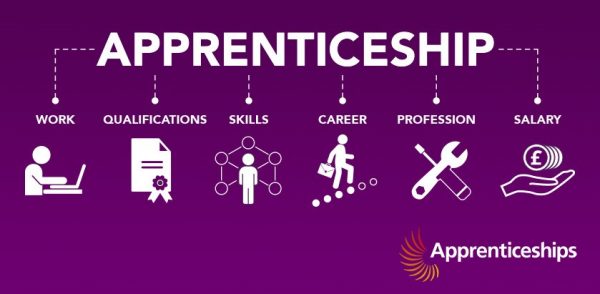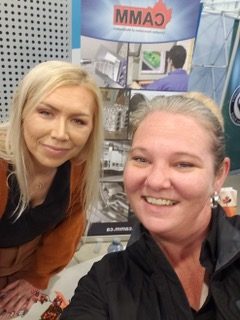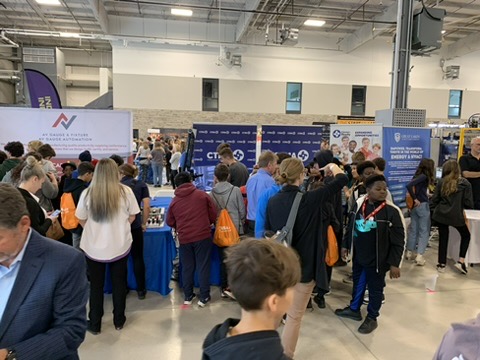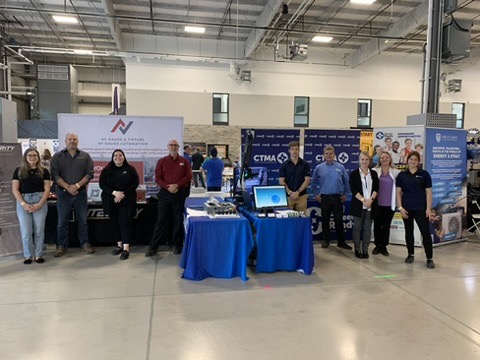
Empowering Next Generation: Pathway to future careers & life changing opportunities
Published Nov 30, 2023 | Posted in Cavalier, Industry, Manufacturing, News
Study. Earn money. Avoid a lot of student debt.
“Apprenticeships are part of the long term growth of the company,” says HR manager Tia Ashley.
“We offer ma ny career opportunities in moldmaking and we invest in youth with a variety of events and also spend time on training for future employees.” An apprenticeship is a pathway to a rewarding career in the trades. As an apprentice, you take classes and learn your trade by working under the direction of experienced workers – and get paid while you do it.”
ny career opportunities in moldmaking and we invest in youth with a variety of events and also spend time on training for future employees.” An apprenticeship is a pathway to a rewarding career in the trades. As an apprentice, you take classes and learn your trade by working under the direction of experienced workers – and get paid while you do it.”
A week in November is dedicated to Apprenticeship Awareness and at Cavalier, it is part of an overall plan for outreach and awareness. National Apprenticeship Week is Nov. 13-19 and celebrated in the UK and the US – and as an international company, Cavalier also wanted to pay tribute to the many apprenticeship programs and intitiatives and of course, those who decided to explore the. many opportunities available.
Recently Ashley attended the LevelUp career fair attracting students from Grades 7 to 12 – coming to our area for the first time.
#LevelUp! is a series of multi-day career fairs highlighting the 144 skilled trades, from electricians to boilermakers and of course, mold makers!

Students in grades 7 to 12 have the opportunity to learn about Ontario’s 140+ trades through interactive exhibitions and hands-on activities, while hearing directly from tradespeople and local employers about life-changing career opportunities.
Ashley made the rounds at the event – talked to exhibitors and said it was a successful event at the LaSalle Event Centre on Front Rd. in LaSalle.
CAMM Executive Director Nicole Vlanich and Cavalier HR Manager Tia Ashley
“Cavalier was able to connect with some great students, teachers, parents and organizations – all part of how we want to let the community know the many opportunities in mold making,” says Ashley.
“Good conversations and some hands- on experiences so students could see that manufacturing has a wide range of careers available to check out. “
Hands-on and classroom training are the foundation of apprenticeships, part of Ontario’s workforce development for centuries. Dating back to the early 19th century, these programs were essential to train workers in various trades, ensuring the growth of Ontario’s industries.
Over time, apprenticeships evolved, but their core principles remained the same – combining hands-on training with classroom education to create skilled, job-ready individuals.
The Ontario Youth Apprenticeship Program (OYAP) is another program supported at Cavalier. OYAP is a specialized program in high school that allows students to explore apprenticeship and consider careers in the skilled trades, generally starting in Grade 11 or Grade 12 through the cooperative education program.
CAMM Executive Director Nicole Vlanich says the LevelUp event was a great way to interact with youth and also show, not just tell , all the opportunities there are in apprenticeships.
“Mold Making is a great option and often overlooked so we were able to talk directly about our members and all the benefits there are about working in this industry.
CAMM is happy to support youth as they consider careers in the skilled trades. We spoke with many who were not aware of the possibilities when entering these careers, so it was a very successful event. And we could also help promote our members , many who have apprenticeship openings.”
Andrew Dowie, MPP for Windsor-Tecumseh and Parliamentary Assistant to the Minister of Economic Development, Job Creation and TradeMember, says apprenticeships are a focus by the current provincial government because of such a great need for staffing in various skilled trades.
 “In Windsor-Essex and across Ontario, I’ve heard the same message from employers. They’ve got highly paid and fulfilling careers to offer but few takers for their positions. Youth can absolutely succeed through the skilled trades and see firsthand that their abilities will move the world for the better,” says Dowie,
“In Windsor-Essex and across Ontario, I’ve heard the same message from employers. They’ve got highly paid and fulfilling careers to offer but few takers for their positions. Youth can absolutely succeed through the skilled trades and see firsthand that their abilities will move the world for the better,” says Dowie,
This year, the Ontario Government funded $224 million to build and upgrade training centres; provided financial support for apprentices to buy tools, and; an additional $160 million in the Skills Development Fund (SDF) to tackle the labour shortage and help at least 100,000 workers get free training to meet the needs of employers hiring in their communities.”
Among the great SDF and pre-apprenticeship funding recipients have been St. Clair College, Windsor Centre for Film, Digital Media & the Creative Arts; Women’s Enterprise Skills Training of Windsor Inc., Workforce Windsor-Essex, LiUNA!625, and UHC – Hub of Opportunities.
Andrew Dowie
“Local companies like Cavalier Tool excel in their craft, create quality products that its employees are truly proud to make, and support their workers through and through with apprenticeships and competitive compensation and benefits, helping families across the region,” says Dowie.
According to a Government of Ontario news release: “Ontario will need over 100,000 new skilled trades workers this decade to help build the province, making it crucial for more young people to have the opportunity to unlock their potential in the trades. The new cities with career fairs this year are Hamilton, Windsor, Sault Ste. Marie, Oshawa and Dryden.”
“Last year’s career fairs were a phenomenal success, giving thousands of students and their families exposure to the many career opportunities in the skilled trades,” said Premier Doug Ford. “As we make historic investments to build roads, transit, hospitals, schools and other critical infrastructure, these expanded fairs will help us attract more young people into the trades and develop the skilled workforce our growing province needs.”
In promotional material it says: “Over 25,000 students in grades 7 to 12, as well as parents and jobseekers, will have the opportunity to learn about these trades through interactive exhibitions and hands-on activities while hearing directly from tradespeople and local employers.
Earlier this year, the Ontario government announced apprenticeship registration increased by 24 per cent in the last year – from 21,971 to 27,319 – as more people joined the skilled trades, playing a role in building Ontario. This follows more than $1 billion investment in the skilled trades over three years, along with the launch of Skilled Trades Ontario / Métiers spécialisés Ontario, as part of its strategy to attract more people into the trades.
The modern apprenticeship system in Canada and Ontario has been shaped by various pieces of legislation, with the Apprenticeship and Certification Act, 1998, playing a significant role in the province’s apprenticeship system.
Canadian Tooling and Machining Association (CTMA) Executive Director Rob Cattle says, “Achieving apprenticeships are on par with any type of educational achievement- you are doing it at the same time as earning a living and contributing to society. You are learning new skills while working which will also include “life skills”, such as budgeting your finances, paying taxes, paying rent, or saving for a car or house – you are not just going to school and trying to make ends meet.”
“Achieving apprenticeships are on par with any type of educational achievement- you are doing it at the same time as earning a living and contributing to society. Often you are paying taxes – buying a house – you are not just going to school and trying to make e nds meet.”
nds meet.”
Since it’s inception, the CTMA and its members have recognized, honored, and provided encouragement to outstanding apprentices and pre-apprentices for the contribution they make to the industry, through our annual Apprentice Awards.
The CTMA’s Annual Apprentice Awards not only recognizes these individuals but supports their achievements by presenting the winners with cash and tooling packages worth thousands of dollars. These awards not only provides the recipients with additional support and acknowledgement, but the entire process increases the awareness and value of skilled trades training, which contributes to an enhanced tooling and machining industry in Canada
Rob Cattle
Cattle says there is less stigma about skilled trades. “Attitudes are changing for the better,” says Cattle. “We believe it is important to acknowledge and support apprentices in our systems. It’s not easy to go through the entire system and at graduation we see it as a big deal.”
CTMA is working to change the academic structure and recognize trade as a great route to go.
Cattle says they encourage winners to bring parents, best other, high school teacher and anyone else important to them as it gives them an opportunity to express their thanks.
“They are achieving something. They want that to be recognized for people important in their lives.
Cattle also attended LevelUP with CTMA and had this to say: “I feel that it is very important to expose students of all ages to the career opportunities in our industry and it was great to see so many grade school students attend this two-day event. It gives them a chance to view many trades in one large event hall and see what sparks their interest. Many “seeds were planted” over the last two days!”
Cavalier assistant GM Doug Brockman attended the annual CTMA AGM this year in London, Ontario where the awards ceremony was held.
“It was good to support our industry and the many apprentices far and wide that won awards,” says Brockman. “We have had winners in the past and this time we were there to support others. Apprenticeships are vital to our industry and to Cavalier.”
Cavalier apprentices Cynthia Cooper and Hunter Hoskins were both recipients of CTMA Apprenticeship Awards designed to recognize, support, and provide encouragement to Apprentices and Pre-Apprentices, through the annual Apprentice Awards Program and their CTMA Education Fund.
The Fund is designed to recognize, support, and provide encouragement to Apprentices and Pre-Apprentices through the annual Apprentice Awards Program. This initiative helps increase the awareness and value of skilled trades training that contributes to an improved tooling and machining industry in Canada.
The CTMA Education Fund in Honour of George H. Shaffer and Michael G. Solcz Sr. was established in 1994 to support and encourage apprenticeship and skilled trades training–something they were both very passionate about. George Shaffer and Michael Solcz Sr. were founding members of the CTMA and both served as president in the early years of the Association. Contributions to the CTMA Education Fund are managed by the Board of Directors of the CTMA and are used to provide awards and prizes to the selected recipients.
Congratulations to this year’s Apprentice Award Winners:
Pre-Apprentice Winners:
- Janier Ippersiel, Unique Tool & Gauge
- Matthew Clark, XL Tool Inc.
Apprentice Winners:
- Josh Bergeron, Collins Electric Services Ltd.
- Casey Blondeel, Manor Tool & Die Ltd.
- Sheradyn Braido, Collins Electric Services Ltd.
- Sarah Carnevale, Bowman Precision Tooling
- Dylan Purdy, AarKel Tool & Die Inc.
- Hayden Tripp, Armo Tool
CMTDA Top Apprentice Winner:
- Bailey Robert, Manor Tool & Die Ltd.
Ontario, known as Canada’s industrial heartland, has a rich history of manufacturing and mold making, with numerous job opportunities for skilled tradespeople.
The History of Apprenticeship Programs in Ontario
In today’s rapidly changing job market, apprenticeships have never been more crucial. Ontario’s manufacturing and moldmaking industries are evolving to meet the demands of modern technology and automation. This shift requires a workforce with a diverse skill set, including a strong foundation in technology, engineering, and problem-solving.
Apprenticeships offer several advantages in addressing these needs:
- Bridging the Skills Gap: With an aging workforce and a shortage of skilled tradespeople, apprenticeships provide a path to ensure the continuity of the manufacturing and mold making industries in Ontario.
- Technological Advancements: Modern manufacturing and mold making rely heavily on technology. Apprenticeships help individuals adapt to new tools and techniques while honing traditional skills.
- Practical Experience: Hands-on learning is invaluable in skilled trades, allowing apprentices to develop real-world expertise.
- Job Security: Skilled trades remain in high demand. Apprenticeships lead to stable, well-paying careers.
- Career Progression: Apprenticeships often lead to specialized roles and even entrepreneurship opportunities.
Apprenticeship Statistics in Ontario
- As of 2021, there were over 40,000 active apprentices in the province, spread across various trades.
- Over 120 skilled trades are recognized in Ontario, including industrial mechanic millwrights, machinists, and tool and die makers – all crucial to manufacturing and mold making.
- The Ontario Youth Apprenticeship Program (OYAP) is a key initiative, allowing high school students to explore skilled trades while completing their diploma.
By providing practical experience, technological adaptation, and job security, apprenticeships are a win-win for both individuals and the industries they support.
With the support of the Ontario provincial government and organizations like LevelUp, more young individuals are being encouraged to consider skilled trades as a promising career option.
At Cavalier, investing in future youth is a vital part of the HR strategy, says Tia Ashley.
“Our experienced staff help us with training and development of apprentices who in turn can get paid while they attend school. It really is a win for everyone.”
Quick Facts
- 1.3 million people are working in skilled trades-related occupations in Ontario.
- At least one in three workers in Ontario with an apprenticeship or trade certificate is aged 55 or over and nearing retirement.
- In total, there were 91,634 apprentices active in Ontario as of April 3, 2023.
- This year, Ontario is supporting 95 new pre-apprenticeship program projects, which are free for participants and combine classroom training with on-the-job learning.
- The Ontario Youth Apprenticeship Program (OYAP) now has more than 72 recruiters across 800 schools so students can learn about the skilled trades at a younger age.
Did you Know?
- Apprenticeship-like systems worldwide can be traced back to ancient Babylon, where apprentices learned various trades and crafts from experienced artisans. The concept of apprenticeship further developed in ancient Greece and Rome. The idea of passing on skills and knowledge from one generation to the next has a very ancient history, but these early systems may not resemble modern apprenticeships.
- In Canada, the formal apprenticeship system in Canada, including Ontario, has its roots in European traditions. As Europeans settled in Canada, they brought with them the apprenticeship system. The specific date of the first apprenticeship program in Canada is not well-documented, but it likely began in the 18th century when skilled tradespeople passed on their knowledge to apprentices.
- In Ontario, the specific date of the first apprenticeship program in Ontario is not precisely recorded, but apprenticeship-type systems would have existed from the early days of European settlement in the region, which dates back to the late 18th century.





